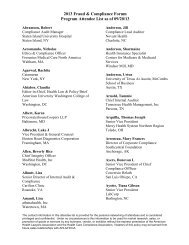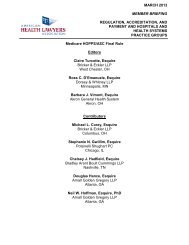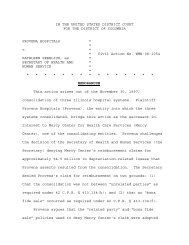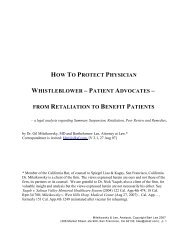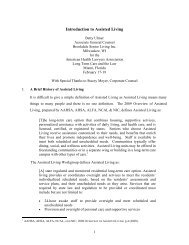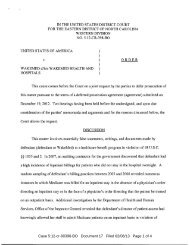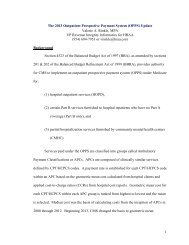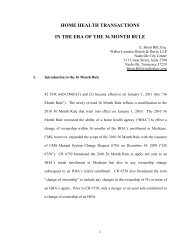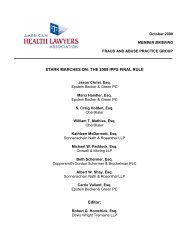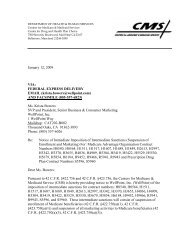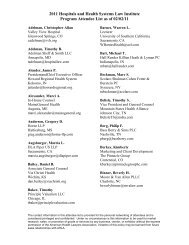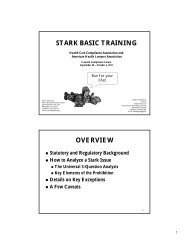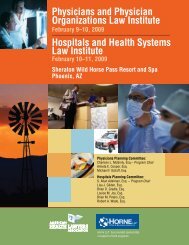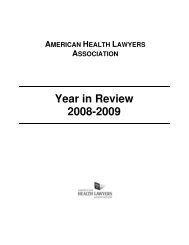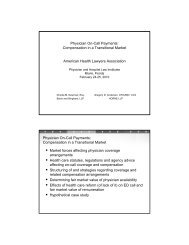AC_Mar2011_Kerry - The American Health Lawyers Association
AC_Mar2011_Kerry - The American Health Lawyers Association
AC_Mar2011_Kerry - The American Health Lawyers Association
You also want an ePaper? Increase the reach of your titles
YUMPU automatically turns print PDFs into web optimized ePapers that Google loves.
ahla<br />
March 2011 Volume 15 Issue 3<br />
For the health and life sciences law community<br />
Don’t Miss AHLA’s <strong>AC</strong>O Program<br />
and Medicare/Medicaid Institute<br />
(page 7)<br />
Incorporating Employed<br />
Physicians into an <strong>AC</strong>O:<br />
Easy as Pie?...<br />
or Recipe for Disaster?<br />
(page 12)<br />
A “Responsible Corporate<br />
Officer” Defense Plan<br />
(page 28)<br />
OFFICIAL MAGAZINE OF AmericaN <strong>Health</strong> <strong>Lawyers</strong> AssOCIAtion
In this issue<br />
COLUMNS<br />
1 First Reflections<br />
This month, AHLA President Rick<br />
Shackelford looks at the hot topic<br />
of Accountable Care Organizations<br />
(<strong>AC</strong>Os) and the potential they have to<br />
transform the healthcare industry, and<br />
where members can find the information<br />
they need to understand <strong>AC</strong>Os.<br />
40 Last Word<br />
AHLA CEO Peter Leibold reflects<br />
the different types of friendships<br />
formed through AHLA, with<br />
members and sponsors. the many<br />
friendships he has formed through<br />
his work with AHLA, and the ways<br />
AHLA members and supporters<br />
have also bonded through shared<br />
experiences.<br />
DEPARTMENTS<br />
12<br />
22<br />
28<br />
Incorporating Employed Physicians into an <strong>AC</strong>O:<br />
Easy as Pie? . . . . or Recipe for Disaster?<br />
This month’s Feature article, by Maria Greco Danaher, Ogletree Deakins Nash<br />
Smoak & Stewart PC, discusses issues related to the direct employment of physicians<br />
by hospitals and healthcare systems and how the formation of an <strong>AC</strong>O might affect<br />
such relationships.<br />
Attack of the Medicaid R<strong>AC</strong>s<br />
In this month’s Member Forum, Sara Kay Wheeler and Stephanie L. Fuller of King<br />
& Spalding LLP, give an overview of the anticipated framework of the Medicaid<br />
Recovery Audit Contractor (R<strong>AC</strong>) program, given the guidance that has been<br />
released by CMS to date, since providers will soon face additional R<strong>AC</strong> scrutiny.<br />
A “Responsible Corporate Officer” Defense Plan<br />
This month’s Analysis, by Michael W. Peregrine and Joshua T. Buchman, McDermott<br />
Will & Emery LLP, details new developments related to the Responsible Corporate<br />
Officer Doctrine’s application in the healthcare industry.<br />
6 Connections to Learning<br />
10 2011 Annual Meeting<br />
and In-House Counsel<br />
Program<br />
18 Public Interest<br />
22 Member Forum<br />
26 Young Professionals<br />
28 Analysis<br />
33 Member News<br />
35 Classified Advertising<br />
Postmaster: Send address changes to AHLA<br />
Connections, AMERICAN HEALTH LAWYERS<br />
ASSOCIATION, 1620 Eye Street, NW, 6th Floor,<br />
Washington, DC 20006-4010.<br />
Printed on Recycled Paper<br />
2 AHLA Connections March 2011
Member Forum<br />
Attack of the Medicaid R<strong>AC</strong>s<br />
By Sara Kay Wheeler and Stephanie L. Fuller, King & Spalding LLP, Atlanta, GA<br />
Providers will soon face additional Recovery Audit<br />
Contractor (R<strong>AC</strong>) scrutiny, as Section 6411 of the<br />
Patient Protection and Affordable Care Act of 2010, 1<br />
as amended by the <strong>Health</strong> Care and Education<br />
Reconciliation Act of 2010 2 (collectively, PP<strong>AC</strong>A),<br />
expands the R<strong>AC</strong> program to Medicaid. 3 Like<br />
Medicare Part A and Part B R<strong>AC</strong>s, Medicaid R<strong>AC</strong>s<br />
are charged with identifying overpayments and<br />
underpayments. 4 This article provides an overview of the<br />
anticipated Centers for Medicare and Medicaid Services (CMS)<br />
framework of the Medicaid R<strong>AC</strong> program, given the guidance<br />
that has been released by CMS to date.<br />
Goal of the Medicaid R<strong>AC</strong> Program<br />
<strong>The</strong> purpose of the Medicaid R<strong>AC</strong> program is to identify<br />
improper Medicaid payments. CMS estimates that the<br />
Medicaid R<strong>AC</strong> program could save the federal Medicaid<br />
program $80 million in fiscal year (FY) 2011, $170 million in<br />
FY 2012, $250 million in FY 2013, $310 million in FY 2014, and<br />
$330 in FY 2015. 5 CMS notes, however, that these estimates<br />
are “highly uncertain.” 6 It is clear that states currently are<br />
under pressure to balance their budgets, given that Medicaid<br />
spending has expanded dramatically while state revenue has<br />
declined.<br />
CMS Prepares for Medicaid R<strong>AC</strong> Implementation<br />
CMS is preparing for the implementation of the Medicaid<br />
R<strong>AC</strong> program. 7 CMS issued a proposed rule for the Medicaid<br />
R<strong>AC</strong> program on November 10, 2010 (the Proposed Rule).<br />
According to the Proposed Rule, states must contract with one<br />
or more Medicaid R<strong>AC</strong>s. States were required to submit a State<br />
Plan Amendment attesting that the state will either establish a<br />
Medicaid R<strong>AC</strong> program or seek exemption from the program<br />
by December 31, 2010, unless the state requested, and CMS<br />
granted, an extension. Importantly, CMS makes clear in the<br />
Proposed Rule that Medicaid R<strong>AC</strong>s are not intended to replace<br />
current Medicaid program integrity or audit efforts.<br />
Industry participants naturally are wondering when to expect<br />
Medicaid R<strong>AC</strong> activity. Originally, CMS proposed an April 1,<br />
2011, implementation date for state Medicaid R<strong>AC</strong> programs. 8<br />
On February 1, 2011, however, CMS issued a bulletin specifying<br />
that states will not be required to implement their<br />
Medicaid R<strong>AC</strong> programs by April 1, 2011. 9 Rather, a new<br />
implementation date will be published in the Medicaid R<strong>AC</strong><br />
Final Rule. CMS did not provide additional insight on when it<br />
expects to issue the Final Rule other than it will be issued later<br />
this year. 10<br />
While CMS has not issued the Final Rule, the Proposed<br />
Rule provides some insight on the likely scope of the Medicaid<br />
R<strong>AC</strong> program. States are required to contract with one or more<br />
Medicaid R<strong>AC</strong>s to audit Medicaid claims to identify underpayments<br />
and overpayments. 11 Medicaid R<strong>AC</strong>s will review<br />
post-payment claims consistent with state laws and regulations.<br />
12 Like Medicare Part A and Part B R<strong>AC</strong>s, Medicaid<br />
R<strong>AC</strong>s will be compensated on a contingency fee basis for the<br />
identification of overpayments. While CMS is allowing states<br />
some flexibility in determining the specific Medicaid R<strong>AC</strong><br />
payment formula, resulting contingency fees may not exceed<br />
that of the highest contingency fee Medicare R<strong>AC</strong> arrangement—which<br />
is currently 12.50%—unless the state submits,<br />
and CMS approves, a waiver of the specified maximum contingency<br />
rate. 13 Any amount exceeding the specified maximum<br />
rate is not eligible for federal financial participation, unless<br />
a waiver of the specified maximum rate has been approved<br />
by CMS. 14 With respect to the identification of underpayments,<br />
the Proposed Rule provides that states may establish a<br />
set fee or reimburse Medicaid R<strong>AC</strong>s on a contingency basis. 15<br />
In addition, while providers must be permitted to appeal<br />
Medicaid R<strong>AC</strong> determinations, states may utilize their current<br />
appeals structure to handle such appeals. 16 Comments on the<br />
Proposed Rule were due January 10, 2011. Not surprisingly,<br />
several industry participants including, but not limited to, the<br />
Federation of <strong>American</strong> Hospitals (Federation), the <strong>American</strong><br />
Hospital <strong>Association</strong> (AHA), and former and current Medicare<br />
Part A and Part B R<strong>AC</strong> contractors submitted comments on<br />
the Proposed Rule.<br />
Medicaid R<strong>AC</strong> Programs Likely to Vary State to State<br />
As the Proposed Rule indicates, states will have broad discretion<br />
regarding the Medicaid R<strong>AC</strong> program design and the<br />
number of R<strong>AC</strong>s with which they elect to contract. According<br />
to a supporting statement CMS released in September 2010,<br />
this discretion will enable states to tailor R<strong>AC</strong> activities to the<br />
uniqueness of their Medicaid program and target areas prone<br />
to improper Medicaid payments. 17 Accordingly, Medicaid R<strong>AC</strong><br />
programs are likely to vary from state to state. Although CMS<br />
has not issued the Final Rule, states are beginning to issue<br />
requests for proposals (RFPs). A review of some of the RFPs<br />
issued to date confirms that the structure of the state Medicaid<br />
R<strong>AC</strong> programs will vary unless CMS issues additional boundaries<br />
in the Final Rule.<br />
For instance, should CMS not establish a national lookback<br />
period in the Final Rule, providers operating in multiple<br />
states would likely be subject to different look-back periods.<br />
For example, the Mississippi Medicaid R<strong>AC</strong> RFP provides that<br />
22 AHLA Connections March 2011
Medicaid R<strong>AC</strong>s will not be permitted to review claims prior<br />
to January 1, 2008, while Ohio’s Medicaid R<strong>AC</strong> RFP suggests<br />
that Medicaid R<strong>AC</strong>s may not review claims more than five<br />
years past the date of the initial determination. In addition,<br />
the type of Medicaid claims subject to Medicaid R<strong>AC</strong> review<br />
may vary if CMS does not outline the specific Medicaid claims<br />
(e.g., Medicaid fee-for-service and/or Medicaid managed care)<br />
subject to Medicaid R<strong>AC</strong> review in the Final Rule. As noted,<br />
the AHA submitted comments on the Proposed Rule and<br />
urged CMS to exclude Medicaid managed care claims from<br />
Medicaid R<strong>AC</strong> review. 18 Notably, the Ohio Medicaid R<strong>AC</strong> RFP<br />
provides that Medicaid R<strong>AC</strong>s are only permitted to review<br />
Medicaid fee-for-service claims. Thus, it is conceivable that<br />
the types of Medicaid claims subject to Medicaid R<strong>AC</strong> review<br />
could also vary state to state.<br />
While the precise limits of Medicaid R<strong>AC</strong> reviews remains<br />
uncertain at this point, one thing is clear, states will influence<br />
the structure of their Medicaid R<strong>AC</strong> programs. Thus,<br />
providers operating in multiple states will need to understand<br />
the specific Medicaid R<strong>AC</strong> framework for each state in which<br />
they operate.<br />
• Thomson Reuters<br />
Medicaid (Review of Provider<br />
MIC)<br />
Thomson Reuters<br />
(Review of Provider MIC)<br />
<strong>Health</strong> Integrity<br />
(Audit MIC)<br />
Strategic <strong>Health</strong> Solutions<br />
(Education MIC) MIC)<br />
Medicaid Fraud Control Unit of Georgia<br />
(MFCU) Control Unit of<br />
Medicaid R<strong>AC</strong>(s) (TBD)<br />
Medicaid<br />
• <strong>Health</strong> Integrity<br />
(Audit MIC)<br />
• Strategic <strong>Health</strong><br />
Solutions (Education<br />
• Medicaid Fraud<br />
Georgia (MFCU)<br />
• Medicaid R<strong>AC</strong>(s)<br />
(TBD)<br />
* Atlanta<br />
Potential Fraud<br />
AdvanceMed Corporation<br />
(ZPIC, Zone 5)<br />
Duplication of Audits<br />
Given that providers are already subject to audits by an array<br />
of entities including, but not limited to, Medicare Administrative<br />
Contractors (M<strong>AC</strong>s), Medicare Part A and Part B R<strong>AC</strong>s,<br />
Zone Program Integrity Contractors (ZPICs), Program Safeguard<br />
Contractors (PSCs), and Medicaid Integrity Contractors<br />
(MICs), the addition of Medicaid R<strong>AC</strong>s into the already<br />
crowded contractor landscape creates some concern as to<br />
how Medicaid R<strong>AC</strong> audit efforts will be coordinated so as to<br />
avoid duplicative audits. 19 To illustrate the proliferation of the<br />
contractor landscape, below is a map of the various contractors<br />
authorized to review provider claims in Georgia.<br />
As providers are well aware, Medicaid claims already<br />
are subject to audits by the federal MIC program. While<br />
the Proposed Rule provides that states need to ensure that<br />
Medicaid R<strong>AC</strong> audits do not overlap audit efforts of other<br />
government contractors and state and federal law enforcement<br />
entities, the Proposed Rule does not provide specific guidelines<br />
on how to avoid such duplication. As noted, several organizations<br />
submitted comments on the Proposed Rule, and many<br />
of the comments expressed concern regarding the potential<br />
Medicare<br />
• Cahaba Government Medicare<br />
Benefit Administrators (A/B<br />
M<strong>AC</strong>, Jurisdiction 10)<br />
• CIGNA Government<br />
(A/B M<strong>AC</strong>, Jurisdiction 10)<br />
Services (DME M<strong>AC</strong>,<br />
CIGNA Government Services<br />
Jurisdiction (DME C) M<strong>AC</strong>, Jurisdiction C)<br />
• Palmetto GBA (Home<br />
<strong>Health</strong> and Hospice Palmetto M<strong>AC</strong>, GBA<br />
(Home <strong>Health</strong> and Hospice<br />
Jurisdiction C)<br />
M<strong>AC</strong>, Jurisdiction C)<br />
• Connolly Consulting (A/B<br />
R<strong>AC</strong>, Region C) Connolly Consulting<br />
•Part C and Part (A/B D R<strong>AC</strong>, Region C)<br />
(TBD)<br />
Cahaba Government Benefit Administrators<br />
Part C and Part D R<strong>AC</strong> (TBD)<br />
Potential Fraud<br />
• AdvanceMed Corporation<br />
(ZPIC, Zone 5)<br />
healthlawyers.org 23
Member Forum<br />
duplication of audits. 20 Noting the existence of the MICs, the<br />
Federation recommended that the Medicaid R<strong>AC</strong> program not<br />
be implemented until there are clear guidelines on how coordination<br />
among the various state and federal contractors will<br />
be accomplished. 21 In addition, the Federation suggested that<br />
Medicaid R<strong>AC</strong>s should be excluded from reviewing any claim<br />
for which payment has been denied or issues that are already<br />
addressed by other program integrity contractors. 22 Similarly,<br />
the AHA urged CMS to revise the Final Rule to specifically<br />
prohibit Medicaid R<strong>AC</strong>s from conducting audits on claims<br />
under review by a Medicaid Integrity Program contractor<br />
or other entity. 23 Unless CMS issues clear guidelines on how<br />
states should avoid duplicate audits, states may adopt varying<br />
methods to reduce the risk of duplicative audits. For example,<br />
the Ohio Medicaid R<strong>AC</strong> RFP provides that the Medicaid R<strong>AC</strong><br />
will be required to build and maintain a data warehouse to<br />
minimize duplication of audits.<br />
Conclusion<br />
Providers can monitor the implementation of state Medicaid<br />
R<strong>AC</strong> programs on CMS’s Medicaid R<strong>AC</strong> “At-a-Glance”<br />
website, available at www.cms.gov/medicaidracs/home.aspx.<br />
<strong>The</strong> website includes, among other things, whether CMS<br />
has received a SPA, whether an exception to the Medicaid<br />
R<strong>AC</strong> program has been requested by a state, and the type of<br />
Medicaid R<strong>AC</strong> fee structure.<br />
In addition to information released by CMS regarding the<br />
Medicaid R<strong>AC</strong> program, providers should consider monitoring<br />
state information concerning the Medicaid R<strong>AC</strong> program, as<br />
the ultimate structure of the state Medicaid R<strong>AC</strong> programs<br />
will be influenced both by CMS and the states. Although CMS<br />
has not issued the Final Rule and some states have yet to issue<br />
RFPs, providers should begin preparing for the arrival of<br />
the Medicaid R<strong>AC</strong>s. Importantly, providers should consider<br />
assessing their contractor preparedness and their ability to<br />
timely respond to Medicaid R<strong>AC</strong>s.<br />
About the Authors<br />
Sara Kay Wheeler (skwheeler@kslaw.com) is a Partner in King<br />
& Spalding’s <strong>Health</strong>care Practice Group in Atlanta, GA. She<br />
has extensive experience in the creation and implementation of<br />
corporate compliance programs and investigations, government<br />
contractor audits (including R<strong>AC</strong>s, M<strong>AC</strong>s, MICs, PSCs<br />
and ZPICs), voluntary disclosure strategies, clinical research<br />
compliance, and managed care arrangements. Ms. Wheeler<br />
also works with King & Spalding’s Special Matters Group to<br />
defend healthcare providers that are investigated by federal<br />
and state enforcement entities.<br />
Stephanie L. Fuller (sfuller@kslaw.com) is an Attorney in King<br />
& Spalding’s <strong>Health</strong>care Practice Group in Atlanta, GA. She<br />
represents healthcare clients in government investigations,<br />
internal investigations, and complex business disputes. In<br />
addition, she advises clients on federal and state regulatory<br />
issues, including Medicare and Medicaid reimbursement,<br />
government contractor audits (including R<strong>AC</strong>s, M<strong>AC</strong>s, MICs,<br />
PSCs and ZPICs), compliance, and fraud and abuse. She is<br />
also a member of AHLA’s Young Professionals Council and<br />
Chair of its Publications Work Group.<br />
Endnotes<br />
1 PP<strong>AC</strong>A, Pub. L. No. 111-148, 124 Stat. 751 (2010).<br />
2 <strong>Health</strong> Care and Education Reconciliation Act, Pub. L. No. 111-152, 124<br />
Stat. 1029 (2010).<br />
3 Section 6411 of PP<strong>AC</strong>A also expands the R<strong>AC</strong> program to Medicare Parts<br />
C and D.<br />
4 PP<strong>AC</strong>A, Section 6411.<br />
5 Medicaid Program; Recovery Audit Contractors, 75 Fed. Reg. 69,037 (Nov.<br />
10, 2010) (to be codified at 42 C.F.R. pt. 455).<br />
6 Medicaid Program; Recovery Audit Contractors, 75 Fed. Reg. 69037 (Nov.<br />
10, 2010) (to be codified at 42 C.F.R. pt. 455).<br />
7 See Agency Information Collection Activities: Proposed Collection;<br />
Comment Request; 75 Fed. Reg. 55330 (Sept. 10, 2010); Medicaid<br />
Program; Recovery Audit Contractors, 75 Fed. Reg. 69037 (Nov. 10, 2010)<br />
(to be codified at 42 C.F.R. pt. 455).<br />
8 See Medicaid Program; Recovery Audit Contractors, 75 Fed. Reg. 69037<br />
(Nov. 10, 2010) (to be codified at 42 C.F.R. pt. 455); a copy of the State<br />
Medicaid Director letter is available at www.cms.gov/smdl/downloads/<br />
SMD10021.pdf.<br />
9 A copy of the CMS bulletin is available at www.nebmed.org/uploadedFiles/<br />
R<strong>AC</strong>%20delay.pdf.<br />
10 Id.<br />
11 See PP<strong>AC</strong>A, Section 6411; Medicaid Program; Recovery Audit Contractors,<br />
75 Fed. Reg. 69037 (Nov. 10, 2010) (to be codified at 42 C.F.R. pt. 455).<br />
12 Medicaid Program; Recovery Audit Contractors, 75 Fed. Reg. 69037 (Nov.<br />
10, 2010) (to be codified at 42 C.F.R. pt. 455).<br />
13 Id.<br />
14 Id.<br />
15 Id.<br />
16 Id.<br />
17 A copy of the supporting statement is available at www.kslaw.com/Library/<br />
publication/HH092010_Statement.pdf.<br />
18 A copy of the AHA letter is available at www.aha.org/aha/<br />
letter/2010/101220-cl-cms-6034.pdf.<br />
19 Id.<br />
20 See, e.g., <strong>The</strong> AHA’s comments available at www.aha.org/aha/<br />
letter/2010/101220-cl-cms-6034.pdf; <strong>The</strong> Federation’s comments available<br />
at www.fah.org/fahCMS/Documents/On%20<strong>The</strong>%20Record/Public%20<br />
Comments/2011/RA_medicaid_comments.pdf.<br />
21 A copy of the Federation’s letter is available at www.fah.org/fahCMS/<br />
Documents/On%20<strong>The</strong>%20Record/Public%20Comments/2011/RA_<br />
medicaid_comments.pdf.<br />
22 Id.<br />
23 A copy of the AHA letter is available at www.aha.org/aha/<br />
letter/2010/101220-cl-cms-6034.pdf<br />
24 AHLA Connections March 2011
Young Professionals<br />
<strong>The</strong> Young Professionals Council at Work: Identifying and<br />
Creating Opportunities for AHLA Young Professionals<br />
Last year AHLA launched the Young Professionals<br />
Council (YPC or Council) to promote the interests<br />
of young members by identifying and creating opportunities<br />
to network and develop leadership skills and encouraging<br />
active participation in AHLA activities, events and volunteer<br />
efforts. Over the past several months, the 15 young professionals<br />
who comprise the YPC have been hard at work. Our<br />
Publications Work Group will give you just a flavor of what the<br />
Council has been up to. – Alison Vratil Mikula, Chair<br />
<strong>The</strong> YPC has been:<br />
❯❯ Planning in-person networking events to take place in<br />
Boston at the 2011 Annual Meeting;<br />
❯❯ Launching the Young Professionals Discussion List as<br />
a forum for sharing insights, collaborating, and engaging in<br />
discussion;<br />
❯❯ Developing a “brown bag” webinar series designed to<br />
address issues of particular interest to young professionals;<br />
❯❯ Collaborating with Practice Group leaders to identify ways<br />
in which young professionals can get involved in Practice<br />
Group activities; and<br />
❯❯ Publicizing opportunities for young professionals to<br />
contribute to Practice Group and AHLA efforts.<br />
<strong>The</strong> commitment of AHLA leadership and staff to engaging<br />
the <strong>Association</strong>’s young professional members and developing<br />
the “next generation” of leaders in healthcare law makes this<br />
an exciting time for us, as young professionals, to become<br />
more active participants in AHLA. <strong>The</strong> members of the<br />
YPC hope that all young professionals will use the YPC as a<br />
resource and look for ways to get involved in and contribute to<br />
the <strong>Association</strong> through Practice Groups efforts, publication<br />
opportunities, in-person events, public interest initiatives, or<br />
other areas of interest.<br />
Our time and talents, as well as the diversity that we as a<br />
group bring to AHLA, are assets to the <strong>Association</strong>. Young<br />
professionals, we hope that you will share your time and<br />
talents and, in the process of doing so, deepen your knowledge<br />
of substantive healthcare law, expand your professional<br />
networks, develop your leadership skills, and have a good time!<br />
Network<br />
<strong>The</strong> YPC Networking Work Group seeks to support young<br />
professionals in the development of strategies for engaging<br />
young professionals and providing opportunities for<br />
networking at three levels (i) attracting and engaging young<br />
professionals as law students; (ii) helping young professionals<br />
connect with their peers and more experienced practitioners,<br />
as they transition from students to practitioners; and (iii)<br />
providing a forum for young professionals to connect with and<br />
develop relationships with other young professionals, other<br />
AHLA members and AHLA leadership.<br />
<strong>The</strong> YPC Networking Work Group is currently working<br />
on development of a “brown bag” webinar series designed<br />
to address issues of interest to young professionals. <strong>The</strong> first<br />
webinar, which we hope to hold in May, will kick-off the series<br />
with a panel of individuals in various stages of their career.<br />
<strong>The</strong> topic of the first webinar will be “When I first started practicing,<br />
I wish I had known…” a candid discussion regarding<br />
the trials and tribulations of developing a practice as a young<br />
professional. <strong>The</strong> Networking Work Group is soliciting ideas<br />
from young professionals on future webinar topics.<br />
In addition, the YPC Networking Work Group is in the<br />
process of developing strategies to reach out to law students<br />
and is working to put together networking events for young<br />
professionals at the 2011 AHLA Annual Meeting in Boston.<br />
Young professionals who would like more information on<br />
the Networking Work Group’s activities, or have ideas for the<br />
Networking Work Group should contact Council member<br />
Andrea Impicciche at andreai@hallrender.com.<br />
Publish<br />
Getting published is one of the most effective ways to<br />
become involved with AHLA and gain visibility among peers.<br />
<strong>The</strong> Publications Work Group is exploring several ways to<br />
encourgage young professionals to write and publish for<br />
AHLA. <strong>The</strong> YPC Publications Work Group helped to review<br />
and provide comments to a proposal for a New Author pilot<br />
program. <strong>The</strong> new program will provide assistance to young<br />
professionals and other AHLA members in identifying<br />
publishing opportunities and providing guidance on how to<br />
author a publication for AHLA. <strong>The</strong> pilot program is expected<br />
to last 6-9 months and involve 5-10 teams of “author guides”<br />
and “author apprentices.”<br />
As part of an ongoing initiative to promote writing opportunities<br />
among young professionals, the YPC Publications<br />
Work Group is working to identify AHLA publication opportunities<br />
for young professionals and identify young profes-<br />
26 AHLA Connections March 2011
sional volunteers. Individuals are encouraged to consider<br />
writing for the AHLA Connections magazine, Practice Group<br />
publications, and the AHLA <strong>Health</strong> Law Wiki.<br />
For more information on the YPC Publications Work<br />
Group or publication opportunities please contact Council<br />
member Stephanie Fuller at sfuller@kslaw.com.<br />
Get Involved<br />
<strong>The</strong> YPC Involvement Work Group seeks to connect young<br />
professionals with opportunities to be more active in Practice<br />
Groups and other AHLA activities. <strong>The</strong> Council has found<br />
that there are many young professionals in AHLA who want to<br />
be more involved, but young professionals often do not know<br />
currently where to look for those opportunities. AHLA leaders<br />
do not have a resource for directly connecting with interested<br />
young professional members, and our group is working to<br />
facilitate those connections.<br />
Young professionals who want to be more involved in<br />
AHLA should subscribe to the Young Professional Discussion<br />
List and watch for future communications about the different<br />
opportunities that exist for young professionals within AHLA.<br />
In the meantime, young professionals can feel free to contact<br />
any of the Vice Chairs of Membership for the Practice Groups<br />
or Council member Robert Hess at robert.hess@huschblackwell.com.<br />
<strong>The</strong>re are a wealth of opportunities for young<br />
professionals to be involved in AHLA and the Council looks<br />
forward to publicizing those opportunities over the next year.<br />
Give Back<br />
<strong>The</strong> YPC Public Interest Work Group is dedicated to<br />
supporting AHLA’s public interest programs. Those programs<br />
are designed to help the public to better understand healthcare<br />
issues and prepare for difficult situations, ultimately leading<br />
to better care and planning for both the healthcare consumer<br />
and the community in which he or she lives. This Work Group<br />
fosters young professional involvement in those efforts.<br />
<strong>The</strong> Council will be sponsoring one of the items to be<br />
presented at the upcoming Public Interest Silent Auction in<br />
Boston during the 2011 Annual Meeting. This item will be a<br />
gift pack designed for young professionals and will include a<br />
registration and lodging at one of AHLA’s in-person programs<br />
as well as several key publications. Proceeds generated from<br />
the Auction will support the public interest mission of AHLA.<br />
If you are interested in getting involved in the Public Interest<br />
Work Group, please contact Council member Tizgel High at<br />
Tizgel_High@chs.net.<br />
Stay Connected<br />
<strong>The</strong> YPC utilizes different forms of social media, including the<br />
Young Professionals Discussion List, professional networking<br />
(LinkedIn), social networking (Facebook), blogging, Twitter,<br />
RSS, tagging, and podcasts. <strong>The</strong> YPC Social Media Workgroup<br />
specifically focuses on developing strategies to connect AHLA<br />
members of the past, present and future in a collaborative<br />
forum to facilitate communication, insights, and promotion of<br />
AHLA membership, involvement, networking, publications,<br />
and public interest initiatives.<br />
<strong>The</strong> AHLA Young Professionals Discussion List provides<br />
a forum for attorneys new to the practice of health law to<br />
share insights, collaborate, and engage in discussion. Join the<br />
Discussion List today!<br />
Recent discussion list topics include: use of social media in<br />
practice; conferences young professionals should attend; educational<br />
materials for new healthcare lawyers; new/hot fields of<br />
practice for healthcare lawyers; health reform implications; and<br />
website resources and blogs for breaking healthcare news.<br />
If you would like to contact the Social Media Workgroup,<br />
please contact Council member Annie Hsu at ahsu@centralhealthplan.com.<br />
Next month: More information about networking events<br />
and opportunities for Young Professionals at the Annual<br />
Meeting and In-House Counsel Program in Boston.<br />
Thanks to the members of the Young Professionals<br />
Council’s Publications Work Group for<br />
this month’s article: Stephanie Fuller, Chair, King<br />
& Spalding, Atlanta, GA; Emily H. Lee, Manatt Phelps<br />
Phillips LLP, New York, NY; Annie Hsu, Central <strong>Health</strong><br />
Plan, Irvine, CA; Stacey Lipitz Marder, Kern Augustine<br />
Conroy & Schoppmann, Garden City, NY; Keith J. Seo,<br />
Riddell Williams PS, Seattle, WA; and Daniel F. Shay,<br />
Alice G. Gosfield & Asociates PC, Philadelphia, PA.<br />
healthlawyers.org 27



